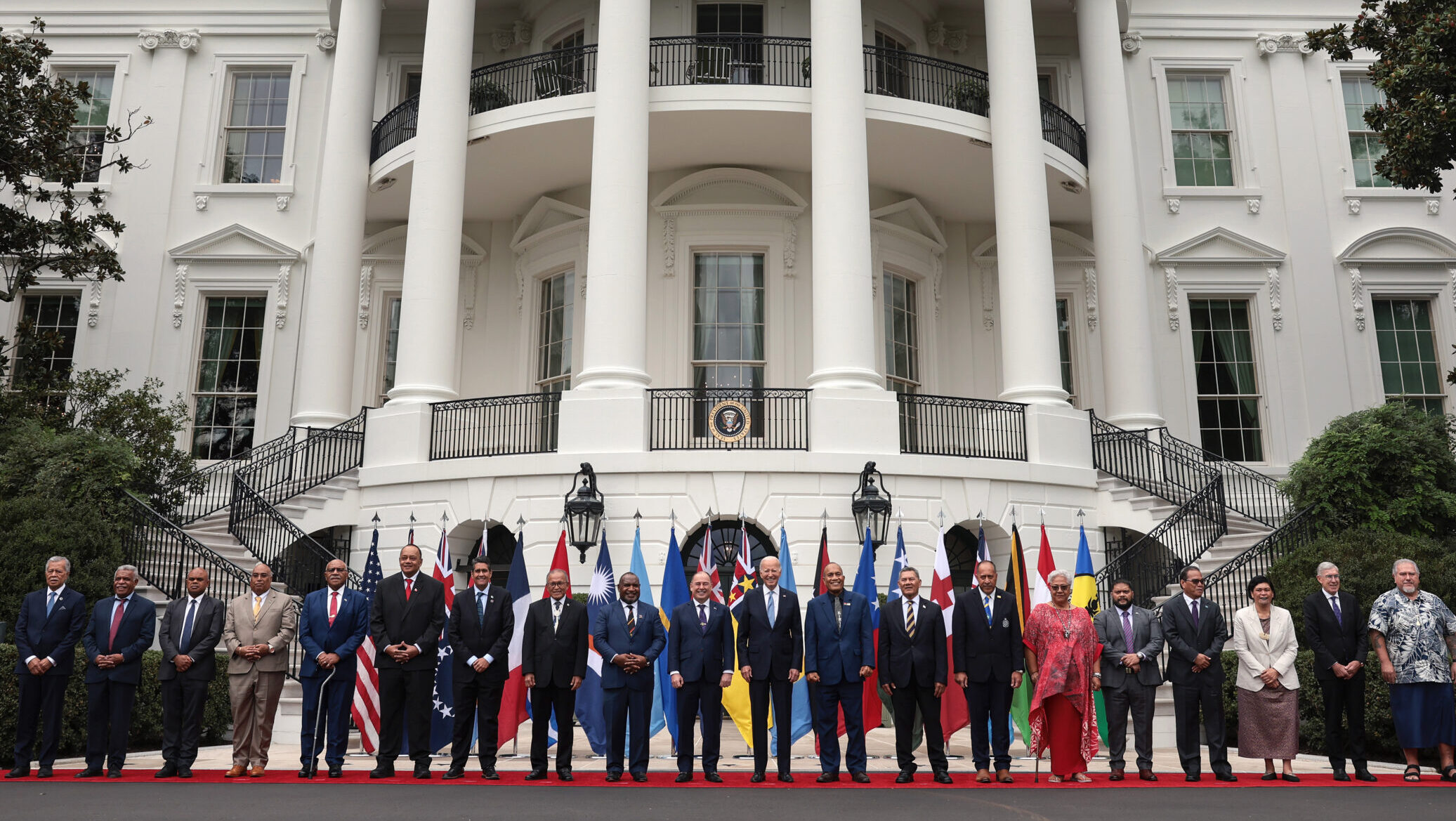WASHINGTON, DC – SEPTEMBER 25: U.S. President Joe Biden participates in a group photo with leaders at the Pacific Islands Forum (PIF) as part of the U.S.-Pacific Islands Forum Summit at the White House on September 25, 2023 in Washington, DC. President Biden and senior administration officials are meeting with Pacific Islands leaders to discuss regional corporation on climate change, economic growth and regional security. (Photo by Win McNamee/Getty Images)
SYDNEY — The US-based Heritage Foundation, closely associated with many supporters of former President Donald Trump, has published a report making competition with China the centerpiece of US policy in the Pacific Islands and urging it pump more money into the region to ensure that American interests be paramount.
“American policymakers should consider the Pacific Islands a region worthy of increased U.S. engagement and resource allocation,” the report says. “While focused on making the case for and to Americans, the strategy also incorporates Pacific Island, allied, and partner interests and perspectives to emphasize shared interests, potential areas of cooperation, and long-lasting engagement opportunities.” The paragraph ends with the line that the US should “counter Chinese ambitions in the Pacific.”
The report, tellingly titled “The Pacific Pivot: An American Strategy for the Pacific Islands,” notes that since the Solomon Islands former leader, Manasseh Sogavare, signed a still-secret security pact with China — catching the western national security establishment by surprise — competition for influence with island populations and their leaders has grown much sharper.
“The Pacific Islands occupy a pivotal location that is important to U.S. efforts to protect Americans and deny China’s regional hegemonic ambitions,” the report says.
But this greater competition for influence requires careful management, the report says: “If the United States does not carefully navigate these relationships, it risks ceding influence and access to China, thereby granting Beijing a potential foothold in the Indo–Pacific that can threaten U.S. national security interests and complicate possible future military operations in Asia, if and when needed.”
Aside from simple competition for influence, the report, authored by Andrew Harding, points to the crucial strategic locations of the islands, as was so well demonstrated during World War II. They straddle the shipping lanes that carry the majority of global trade, span vast areas of the Pacific’s fishing grounds, gas fields and possible sea floor mineral riches.
As to how to accomplish the goals sought by Heritage, America should pursue “at least one, if not more, of four vital national interests:
“Safeguard America and the American people;
“Bolster deterrence vis-à-vis China and, if needed, combat capabilities;
“Improve the economic well-being of the American people; and/or
“Strengthen regional attitudes and perceptions toward America, i.e., enhance ‘soft power.’
There is reasonable room for debate regarding whether this national interest is ‘vital’ or on par with the other three.”
In keeping with Heritage’s heritage as the most stalwart of the conservative think tanks in Washington, the report focuses on the American Pacific territories and what it says are “immigration loopholes” there that “should be closed.”
But the aperture widens when the report argues that the primary goal of the United States in the Pacific should be “to defend its people, territories, and way of life.”
While it praises elements of the Biden Administration’s Pacific Islands strategy, the first of its kind, Heritage says it “possesses two primary shortcomings,” ones that will sound familiar to those who follow Trump closely.
The Biden strategy “does not explain” how it materially benefits America, the Heritage report says, noting that it places great emphasis on climate change and its effects on the islands, something that many experts said played an important role in the Solomon’s decision to bend toward China.
Instead of putting American interests first in the region, Biden’s strategy “ranks the interests of the Pacific Islands above American interests and does not explicitly articulate why or how any of the proposed objectives or lines of effort directly benefit America’s interests or the American people.”
In keeping with the Republican Party’s strongly skeptical view of climate change, the report cites what it calls the Biden strategy’s “overemphasis on combatting the effects of climate change as a vital American interest.” (original italics).
Instead, Heritage says “a stronger strategy would include a more realistic, straightforward acknowledgement of the threats China poses to the region and the economic opportunities the U.S. could support—even if they may not be exactly what the region may prefer to hear.”
While Heritage does not dictate what the Republicans in Congress or a possible Trump administration do, no other think tank carries as much weight in those communities. Heritage’s Project 2025 document is widely viewed as a blueprint for how a Trump administration will govern, and a recent document from the organization openly billed itself as “a draft Nuclear Posture Review (NPR) for a 2025 presidential administration.”










